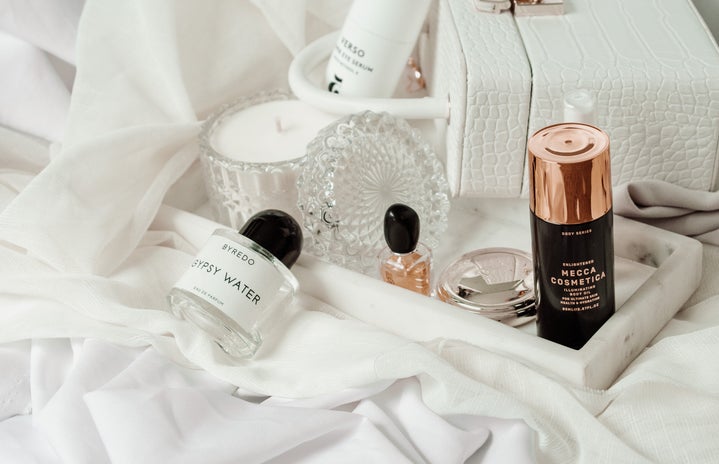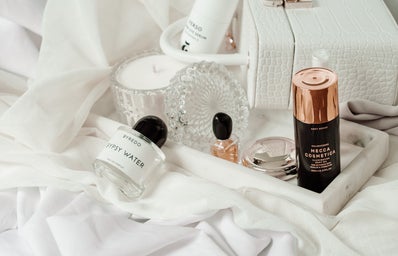It’s easy to get lost in the millions of posts, articles, and blogs about skincare, but Melannee Nguyen was determined to find out for herself what she should and shouldn’t do for her skin. Nguyen is a 20-year old biomedical engineering student at the University of Utah. And even with her busy schedule she still managed to teach herself about the science behind the skin, and the best products that protect against Utah’s dry, polluted air.
A few years back Nguyen found out her thyroid wasn’t working as it should. The thyroid controls our hormones, and imbalances often manifest themselves as acne. In an interview over some chai tea, Nguyen spoke about her solo struggle with acne. She wasn’t wearing any face makeup to our interview, a testament to how far she’s come in her skincare journey.
Nguyen’s family was fortunate to have good skin genes, so when she started breaking out she felt more self-conscious of blemishes. “I took it upon myself to read more about it and the things that work for me,” she said. Hormonal and medically-related acne isn’t something you can control, and all the products in the world won’t help unless the root of the problem is addressed. In Nguyen’s case seeing doctors and professionals helped her initial skin problems subside.
Once her hormonal breakouts quieted down after seeing a dermatologist, Nguyen still wanted to improve her skincare routine by digging into how the environment affects it.
Nguyen said that Utah’s dry air naturally makes the skin more reactive, as it doesn’t retain as much water as it would in a humid climate. To give your skin a chance it’s important to wash and moisturize every night, but as with most things in life, it’s a bit more complicated than that. She explained the importance of the difference between products that hydrate and ones that moisturize.
Moisturizers are emollients—products that keep and lock in moisture—whereas hydrating formulas put moisture in, plumping and balancing the skin with water. Nguyen loves using a moisturizer after she’s hydrated her skin for ultra-deep hydration that gives all other products a cushy base to cling onto and protect.
There are plenty of measures you can take to get closer to the skin you want. Even though perfection is a fantasy, Nguyen spoke of more strategies to help renew your skin’s elasticity and health as well. Retinol, which carries a lot of Vitamin A, accelerates the skin’s shedding process because it stimulates the production of new blood cells. This smooths wrinkles and fades dark spots by producing more collagen. But retinoids shouldn’t be taken lightly, as new skin is extremely sensitive and vulnerable to outside elements. With new skin comes more responsibilities, and SPF isn’t something to skip. It protects your skin from the most harmful exposure possible—the dreaded UVA and UVB rays.
Another way to speed up skin cell turnover is a chemical exfoliant. Physical exfoliants like scrubs and masks have a time and place, but they only get the top layer of skin. Nguyen said the roughness of the exfoliant matters as well. An example is the wildly popular St. Ives Apricot Scrub, which is way too harsh for the skin on the face. Intense exfoliating can cause micro-abrasions which only allows more bacteria to get in. In fact, St. Ives is under a $5 million class-action lawsuit right now due to its “sandpaper”-like feel and possibly accelerating the aging process via inflammation.
Chemical exfoliants are usually the way to go considering Utah’s dry, polluted air makes residents’ skin more reactive to imbalances. These type of exfoliants include gentle acids that unclog pores: BHA and AHA. These are alternatives to those that don’t want to use a retinoid, as those can be too potent for really sensitive skin. Some chemical exfoliants on the market are Solution by Glossier, Peeling Solution by The Ordinary, and Paula’s Choice Skin Perfecting Gel.
General skincare and upkeep like daily washing, moisturizing, and protecting from the sun are the basics.
The first step is to draw out the impurities. Recently activated charcoal has become popular in products all across the beauty industry because of its absorbing properties. Activated charcoal comes from carbon soot that’s been treated to have tons of little air pockets, giving it a large surface area with more space to absorb things around it. Impurities and toxins trapped in the skin are drawn out by the charcoal, holding up to 200 times its weight as reported by Daily News. According to Everyday Health, some of the beauty community’s favorite charcoal products are the BIORÉ Self-Heating One Minute Mask and the Yes to Tomatoes Activated Charcoal Bar Soap.
The Salt Lake Valley has done us dirty—literally. But when there’s a demand the supply is bound to follow, and skincare companies around the world have created niche products to clean and protect the faces of citizens living in even the filthiest of air. It’s common to see people wearing breathing masks around the U’s campus especially during the winter. The inversion in Salt Lake put a “lid” on the valley, creating a bubble of toxins, gases, and particulates that give a similar effect to smoking cigarettes. If breathing masks work as a filter for your lungs, it only makes sense that we would want the same for our skin.
With an intense schedule, health complications and the general ups and downs of college life Nguyen has found skincare to be an oasis amongst the chaos. “I use skincare as a way to cope, it gave me control over the day,” she said. And she’s not alone, even just five minutes of taking care of yourself can boost your mood and confidence to put your healthiest face forward.
Photo via Nguyen’s Instagram



